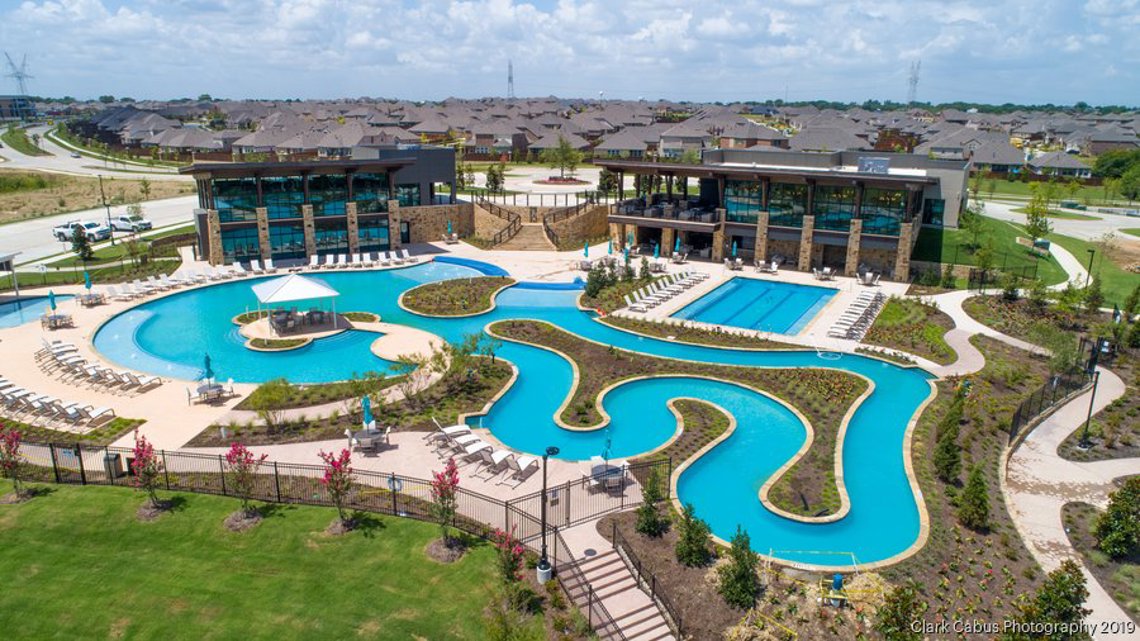Amenities arms race creates eye-popping features in master-planned communities.
DALLAS — This article was originally published by our content partners at the Dallas Business Journal. You can read the original article here.
Kayak a crystal-clear lagoon. Float a lazy river. Release your inner Tarzan in a treehouse or on a zip line.
Those are a few of the everyday activities possible for residents of master-planned communities throughout North Texas, which boasts some of the top residential amenities in the nation.
Gone are the days when timeworn tennis courts and an over-chlorinated swimming pool would suffice. Today’s homebuyers want more. They have an affinity for better amenities, and the creators of the mega-villages in which they shop for homes have taken note.
You’ll find climbing walls, craft centers and community gardens. Surf simulators, splash zones and swim-up bars. Lagoon-anchored mini-cities are making a splash. And pickleball’s popular too.
Developers of master-planned communities say having first-rate amenities where homeowners and their families can gather, relax and have fun is increasingly important to boosting residents’ spirits and spurring home sales. Creature comforts and modern conveniences have become essential in a highly competitive marketplace at a time when home prices have soared and interest rates hang stubbornly high.


Fred Balda, president of Dallas-based Hillwood Communities, said one amenity outranks all others — although it’s not as trendy as pickleball courts or a luxury lagoon.
That amenity is schools. Hillwood, like many of North Texas’ top developers, works to incorporate schools into its master-planned communities by collaborating with local school districts.
If a residential community doesn’t have highly rated elementary schools on site or nearby, parents aren’t going to buy a house there, regardless of other extras, Balda said.
“We consider on-site elementary schools a necessity,” he said. “They are the most important amenity buyers look for in a new community. We work directly with school districts from day one.”
But features catering to recreation and relaxation rather than reading and writing are valuable too, Balda said.
After schools, Balda ranked lifestyle programming and things like dog parks high on the list of what residents seek in their pursuit of happiness.
Homeowners want dog parks designed with agility courses, water stations, shade for pets and people, and room for Rover to run, he said.
Lifestyle programs and events that help neighbors meet each other are essential, Balda added. Hillwood’s neighborhoods offer cook-offs, singing contests, holiday parties and movies on the lawn. Fitness classes, happy hours, bake sales, block parties, nature adventures and community service opportunities also appear on the sign-up lists in Hillwood and other developers’ communities throughout North Texas.
Those types of activities foster long-term friendships, create safer neighborhoods and build a sense of community, Balda said.
“Schools may be our buyers’ number 1 selection criteria,” he said, “but a sense of community is often tied or a close second to schools.”
Residents also crave convenience.
“Things that make their busy lives easier include food truck visits, technology enhancements, coworking spaces and on-site HOA offices,” Balda said.
This being Texas, shade is also crucial, Balda said. Hillwood’s developments check that box by incorporating covered indoor/outdoor pavilions with large fans, indoor gathering spaces and resort-style or lap swimming pools with cabanas, tanning ledges and places for the little ones to splash around safely, he said.
Creating places for people to stay active is important too, he added. That ranges from indoor/outdoor fitness centers with cardio and stretching stations to outdoor cross-fit and ninja-style outdoor courses.
Ben Caballero, founder and CEO of Dallas-based new-home brokerage HomesUSA.com, said amenities are gaining significance as massive housing communities sprawl ever further from the core of DFW. Caballero and his company work with more than 60 homebuilders in DFW, Houston, Austin and San Antonio to list and sell their homes. Last year, Caballero and HomesUSA sold more than 7,000 homes totaling over $3.6 billion for builders such as Ashton Woods Homes, Lennar and Toll Brothers.
“Builders are building so far out now,” he said. “First, I think they can do that because a higher percentage of people are able to work remotely. And second, they need to have amenities within the community so that people will have amenities. Otherwise, if they’re in a little city 40 miles from Dallas, what are they going to do?
“We’re fortunate here in Texas that we have enough land that we can build those types of communities,” Caballero said. “It’s a good solution for a lot of people.”